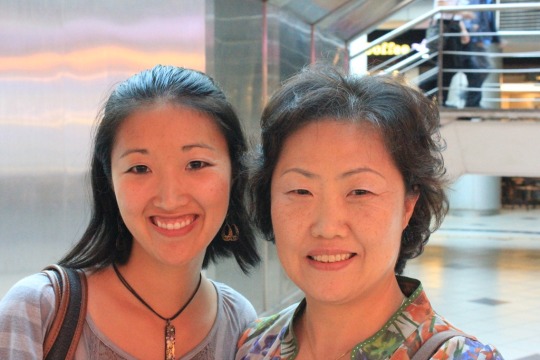By Kira Donnell

The author and her birthmother.
I think I am always destined to leave this city with a sense of loss. This is the third time I have left the city of my birth, but the first time I have left with a proper goodbye to my mother, and a promise to return.
We meet Omma in the lobby of our hotel; Omma rushes up to me and embraced me in a big hug, whispering “Sarang hae, sarang hae.” I introduce Omma to Amul, and she grins broadly as she hugs him. “I love you because you make Kyung Joo happy,” she says.
The day is bittersweet, seeing Omma again. We are reaffirming our new relationship. It thrills me to be able to bring two disparate sections of my family together as I watch Omma laugh at Amul’s long legs and his clumsiness with stainless steel chopsticks. Yet, both of us know it is impossible to fit everything we want to share, everything we want to say, in an afternoon.
At one point, when Amul excuses himself to use the restroom, Omma turns to me and says, “I want you two to have a wonderful life together. Be a good wife for Amul.”
What does being a good wife, having a good life, mean to Omma? She married a man she did not love instead of committing suicide. But she is happy now, has a family that she adores. She tells me her husband is a good, kind man, and I believe her. I believe that though she did not marry him in love, she has always taken her wedding vows very seriously and has grown to love the father of her daughters. She keeps me a secret from him not for my sake, but to protect him. She doesn’t want to cause him pain, for him to lose face. I wonder what Omma sees when she looks at Amul and me. Not merely the steady safe love she has with her husband. Not the passionate but tenuous love she had with my father. Something more, I hope. Something deep and lasting.
I’ve found an old journal entry from the last time I was in Pusan:
July 15, 2001
Pusan
I had a dream about her last night. I can recall vividness in rich greens and pinks. We sailed down a pebble-bottomed stream, she in a white cotton skirt, me resting between her knees, sitting cross-legged in the bottom of the boat. The air smelled of frangipani. Her cool hands on my forehead felt like home—neither Michigan nor Korea, but a place I didn’t even know existed— and she laughed high and tinkling, like scattering diamonds.
I remember the feel of the smooth sun-warmed keel beneath my hands and the low creak of contented wood as we let the current carry us. The eddies reached their fingers out to caress our boat. The boat picked up speed as we navigated large boulders, and water sloshed over the sides into my lap. I held my breath through the rapids, pitching to and fro with the little rowboat. Skating onto smoother waters, I turned around, reaching for her hand. But she had disappeared.
It always happens this way, when I dream her. She vanishes, and only then do I realize that I never see her face.
I am leaving my city, returning to the plainness of overcast Midwestern skies. I’ll remember the horizon, how it looked at daybreak with the gentle fog rolling in. And the beach, the rolling waves. Yet, it’s not enough. I’m still grasping for something of this place that will make it mine. A sign, to show me that I’ve come home. Something to tell me where to go from here.
At last, I know I dreamed true—the sound of Omma’s laughter is like jewels, each precious and sparkling. But leaving now is just as hard as it was nine years ago. We sit across from each other in the hotel lobby, and Omma clasps my hand tightly across the Formica table.
I try to tell her in my clumsy Korean, “You are a good mother. I love you.” She nods, blinks back tears, and reaches for Amul who sits beside me. Six hands tangle and weave like roots of a family tree, with knots and scars and chipped nails. Squeezing our hands, Omma gives us last minute advice, “Love each other. Have a beautiful life together.”
Omma loosens her grip to reach for her handkerchief, and Amul uses the opportunity to slide away, giving us a moment alone while he gives instructions to the cab driver who will take us to the airport. We stand, and I press my forehead to Omma’s as we hold each other in these last moments.
The cab is ready, and Amul waits patiently for us to say our good-byes. How do I leave Omma behind when I’ve just found her? How can we part with so much unsaid? In the end, the decisions is not up to me. Omma ushers us into the cab, “Go, go.” The good-bye is too painful for her, so she severs the connection abruptly, like tearing a bandage off in one fell swoop. She closes the cab door and sends us on our way, a watery smile on her face as she waves, a small lone figure on the side of the road in Pusan, standing strong against the buffeting ocean wind and searing loss.
About the Author: Kira Donnell (birthname Park Kyung Joo) is a doctoral candidate at the University of California, Berkeley in the Department of Ethnic Studies. Her research looks at the artistic forms of expression stemming from the transnational Korean adoption experience. Kira reunited with her birthmother in 2010 and was welcomed into a family of beautiful, fierce, strong, resilient women. She documents her reunion and the continued joys and heartbreaks of building upon these new relationships on her blog at kiradonnell.com.
